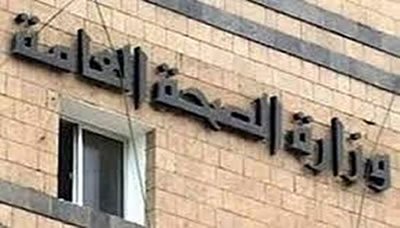Health Ministry Condemns US-Saudi Escalation, Continued Detention Of Fuel Tankers
The Ministry of Public Health and Population organized a protest condemning the US-Saudi-Emirati escalation and the continuation of detention fuel tankers. The participants denounced preventing fuel tankers from entering the port of Hodeidah, despite obtaining UN permits and completing all examination procedures.
They stressed that the arbitrary violtions of aggression will lead to the halt of many public and private hospitals, facilities, specialized centers, dialysis centers, oxygen factories, medical laboratories and blood banks during the coming hours. It will also lead to the suspension of intensive care services, obstetric and neonatal emergencies, and ambulances, which endangers the lives of tens of thousands of patients. Citizens are at risk of certain death.
A statement issued by the protest reported the numbers and indicators that show the scale of the health disaster in the event that the ban on fuel and the deliberate destruction of the health system will result in the suspension of 339 public and private hospitals and ten oxygen factories, in addition to stopping the services of intensive care departments and major and minor operations. The statement pointed that 20 government, charitable and private dialysis centers will stop their services, threatening the lives of 5,000 renal failure patients, as well as 2,000 newborns needing care and nursery services, and 500 cases needing caesarean sections.
The statement mentioned that continuing to prevent the entry of fuel tankers will lead to the suspension of all diagnostic methods and radiotherapy and increase the difficulty of moving patients between governorates to receive treatment, especially patients with tumors and chronic diseases.
The ministry held the US-Saudi aggression, international community and the United Nations responsible for the repercussions of the continued detention of fuel tankers and its disastrous effects on the health sector and the low level of medical and treatment services provided to citizens.
The statement praised the steadfastness of all health sector workers, their sense of responsibility, and their national and humanitarian duty in light of the continued aggression and siege.
Yemen Petroleum Company announced that the US-Saudi-Emirati aggression is still detaining nine fuel tankers, including a gas vessel. The company confirmed in a statement, Saturday, that the aggression continues to detain eight fuel tankers containing 198,655 tons of gasoline and diesel for about five months.
The company indicated that all the tankers completed all UNVIM procedures in Djibouti, and obtained United Nations permits, which confirms the violation by the relevant United Nations bodies of the International Convention on Human Rights provisions, as well as its permanent disregard for the Stockholm Agreement.
Earlier on Friday, the company announced that the US-Saudi-Emirati aggression had seized a new fuel tanker belonging to the World Food Program.
The official spokesman for the company, Issam Al-Mutawakil, stated that the coalition of aggression seized the tanker (Eships Barracuda) of the World Food Program, which was carrying 4,022 tons of diesel.
He pointed out that the forces of aggression forcibly took this tanker off the coast of Jizan, despite obtaining the permits of the UN Verification and Inspection Mechanism.
On Wednesday, Yemen Petroleum Company (YPC) confirmed that the US-Saudi-Emirati aggression had seized a new fuel ship belonging to the private sector.
The spokesman of the Yemen Petroleum Company, Issam Al-Mutawakil, stated that the aggression detained in international waters the ship UHUD bought by a factory in the private sector, and it is carrying 30 thousand tons of diesel.
As part of its economic war, the US-Saudi aggression worked to drain about 97% of the Yemeni state’s resources, either by controlling them militarily such as oil and gas sources, freezing Yemeni foreign assets and transferring them to mercenaries and financing coalition operations, or imposing siege on the vital port of Hodeidah and the most important port after Aden, which is still in the grip of Sana’a and out of control of the aggression.
The coalition of aggression continues to piracy, detaining fuel ships, and preventing them from entering the port of Hodeidah, despite obtaining permits from UN, which aggravates the humanitarian catastrophe due to the suspension of many vital service sectors, especially hospitals, electricity, water, cargo trucks, as well as waste trucks.

